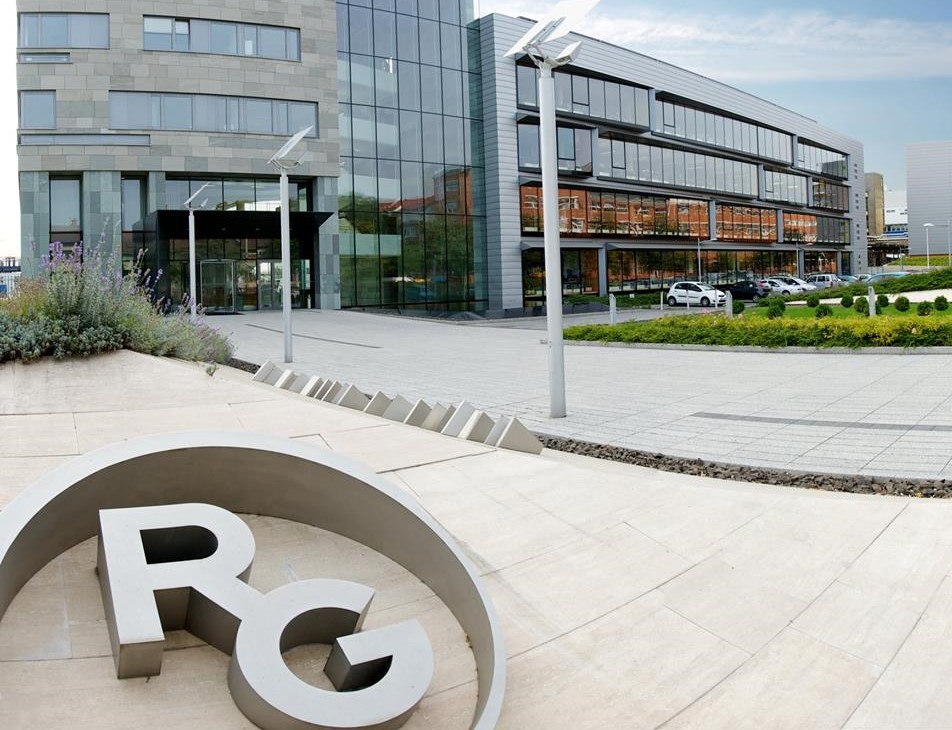
The Hungarian pharmaceutical giant has already appointed its new chairman.Continue reading
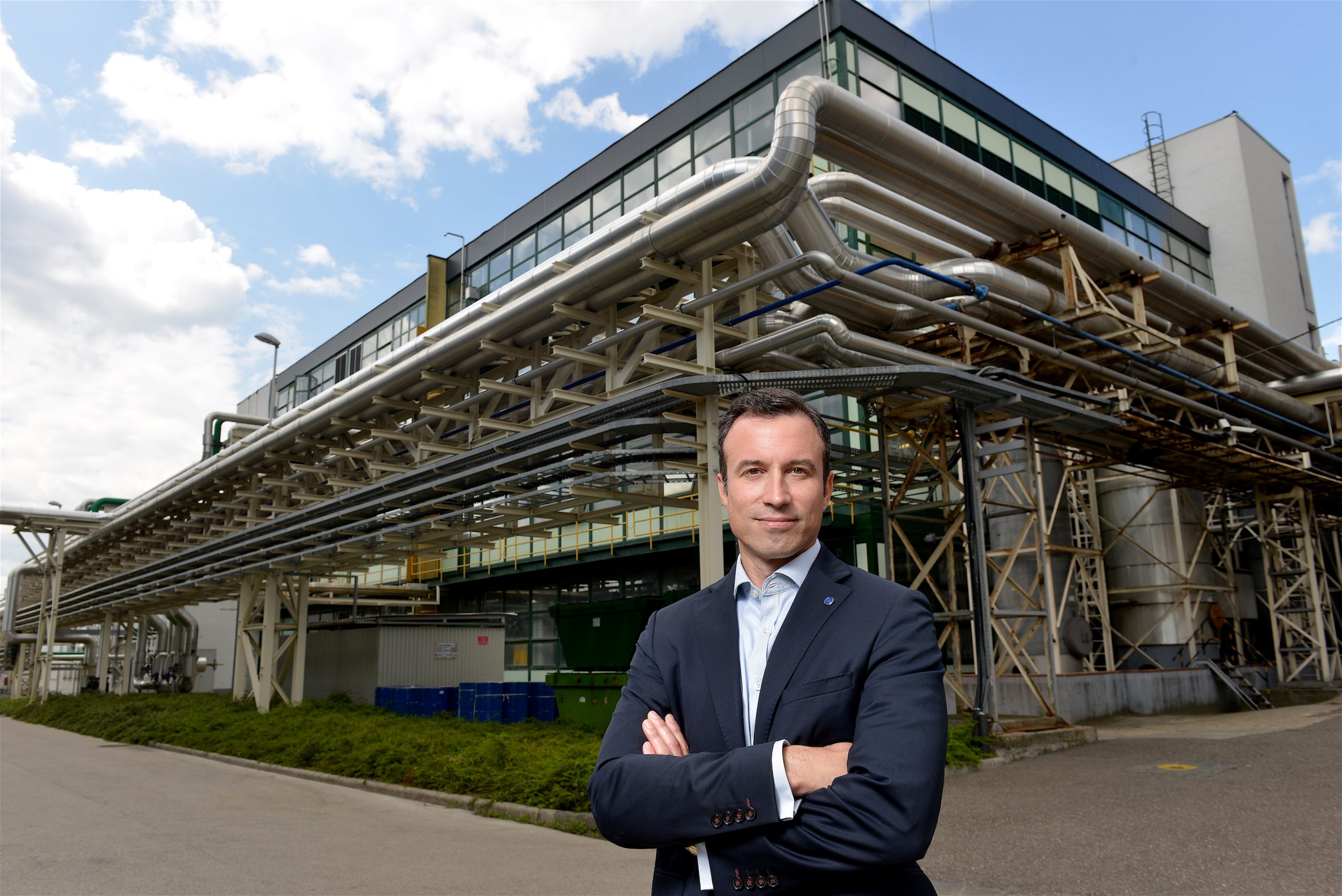
Gábor Orbán has been appointed CEO of the pharmaceuticals giant seven years ago, and had to face a multitude of external crises, including the Covid pandemic, as well as the outbreak of the war in Ukraine. Despite all the difficulties, he has navigated his company through these hurdles with great success. Hungary Today has been granted an exclusive interview with the CEO at the company’s headquarters in Budapest.
You have been CEO of RG since 2017. It is hard to imagine a period more fraught with global crises than the last 4-5 years. As a top manager, how have you managed to strengthen the company and help it through the difficulties of the last few years?
Our difficulties did not start with Covid. At the beginning of my tenure as CEO, we had a succession of external shocks. In fact, as far back as in 2018 we had to withdraw one of our key products from the market. Shortly thereafter, Covid presented a very serious unexpected challenge to all economic operators. We were able to take these twists and turns, meet our obligations to our patients and ensure the supply of medicines. I am also proud of the fact that we succeeded in protecting the health of our colleagues and the health of the wider community during these times.
At that time, it was conceivable that our industry would benefit from the impact of the whole world seeing how fragile health is. Of course, reality was different. Post-Covid, the stimulus measures caused the whole industry to come under quite a lot of pressure around the world. Demand shifted from the service sector to industry. The consequence of this was that global supply chains felt the effects of transport difficulties, procurement difficulties, increased lead times. Shortages of basic commodities also became more frequent.
This was then followed by the Russian-Ukrainian war, and at the onset we had to deal with real human tragedies and very difficult situations. We have a center in Kiev, a commercial office with over two hundred of our colleagues in Ukraine, who are thus being exposed to the horrors of war.
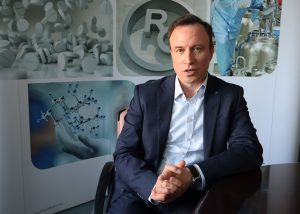
Photo: Hungary Today
A layman might think, with some cynicism, that the only winners in the Covid pandemic were pharmaceutical companies, but Richter’s historical performance seems to suggest otherwise. Can you shed some light on this apparent contradiction?
The pharmaceutical industry behaved in this situation exactly like any other manufacturing industry player. It was exposed to the challenges of business continuity: protecting the health of colleagues, safeguarding jobs, ensuring continuity of supply. For those in vaccines, this was obviously an opportunity but Richter has never been in the vaccine business in its 120 years of existence. The other part of the industry that benefited from this was smaller research and development companies. Suddenly they were inundated with capital, because what investors saw was that these companies now have a huge perspective. The market for small biotech companies, startups really exploded back then.
What we perceived from that was an indirect effect. Orders from these small biotech companies started to come in stronger than before. Other than that, Covid has not had any positive impact on our company. What is certain is that we produced the Remdesivir drug in record time and were able to supply the public hospital system in the quantities needed. This drug treated the stages of Covid when the patient is not yet on a ventilator but is close to it. It is an antiviral that was originally developed for Ebola at the time but was found to be useful in treating Covid patients. There were no available stocks back then, therefore it was lifesaving for Hungarian patients that we could develop its generic version in a very short time.
2023 was a dramatic year for biotech companies, with a record number of them going bankrupt. Bucking this trend, RG’s small market capitalization now stands at well over €4 billion, the company has annual revenues of around €2 billion and its shares hit a record high of close to 10,000 forints. What decisions have been taken to gain an advantage over competitors and increase the company’s turnover?
We managed the challenges well for two main reasons: the first is that our business model is diversified, Richter operates in many markets, with many technology bases and a wide range of therapeutic areas. This diversity in geographic presence, technology and therapeutics means that you can always rely on at least one of them to deliver.
In addition, our lead product Cariprazine in the United States has been much more successful than expected, in terms of both its social and business impact. It is an anti-psychotic, originally used for schizophrenia and manic or mixed episodes of bipolar I disorder, later it was also approved for bipolar depression and as an adjunctive therapy for the treatment of major depressive disorder. It has now treated over 1.3 million people. It is marketed in America by our partner, Abbvie, the second largest pharmaceutical company globally. Thanks to Abbvie, there is a good chance that this drug might become the most widely used anti-psychotic ever.
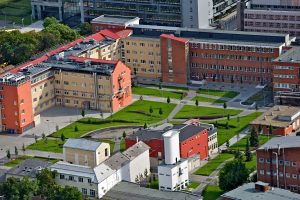
Part of the Gedeon Richter administrative and manufacturing facility in Budapest. Photo: Gedeon Richter
RG has significant international interests, but the fact remains that it has a relatively small domestic market in Hungary. Many Hungarian companies complain about this, but how much of a factor is this for you in an EU common market?
I think they are right to say that it is very difficult for such a small country to compete on a global level in the international market. We also see with our competitors that without domestic embeddedness and support, none of them would be able to compete in the international market. The secret of large firms operating in small countries is always that economic production size can only be achieved through exports.
This can be exports to the East or to the West. The two are not the same, because we have decades of history in the COMECON markets that gives us local knowledge of the East on which to build. There are examples of successful market entries of several Hungarian companies in eastern countries. It is the westward expansion that is spectacularly failing for most who try. Exporting knowledge, building a brand is a much bigger challenge than in the East or at home. Even building an affiliate or any facilities in the West requires a higher wage level and a much higher added value. In richer countries, even Richter was mostly able to create something lasting and world-class only in the context of local partnerships.
And there is one more important factor that explains why there is less competition in the East than in the West in the pharmaceutical sector. It is not possible to build up a pharmaceutical company to the level Richter is at today with a greenfield start. We have a strong tradition going back over a century, which is not only a historical asset, but pharmaceuticals is an industry where you cannot build from scratch. This is why building a pharmaceutical industry from square one tends to fail. Especially in the post-Soviet region, we see such attempts, which do not tend to succeed very well.
Is not the difficulty in Westward expansion the result of some kind of market protectionism, something we can see even at a national level within the EU? Or could it be a consequence of a country’s image and brand. When someone says that they are a Swiss pharmaceutical company, this projects a strong impression of a brand worldwide, whereas in the case of Hungary the brand power is far less potent.
Hungary is not a brand like Switzerland in the pharmaceutical industry. But in neuropsychiatry, we are starting to gain some serious recognition, thanks to the fact that research in this field at Richter goes back decades, and on the other hand, we are surrounded by a scientific ecosystem of Hungarian scientists who are world-class in brain research and neurosciences. The current president of the Hungarian Academy of Sciences is a brain scientist, and the one two presidencies back is also a world-renowned neuropharmacologist, who is also the newly elected Chairman of Richter’s Board of Directors (E Sylvester Vizi, ed. note). In this field I believe Hungary has indeed achieved world-class results.
Hungary may not yet be among the world leaders in the most crowded fields, but we have a chance in niche areas. In gynecology, for example, Richter is aiming for first place in Europe. This is a small market relatively speaking, but no Hungarian company has ever attempted to become the market leader in Europe in any field. Our plan is to achieve this by the end of the decade. This year, Richter could already be the largest producer of oral contraceptives in Europe. We are already market leaders in several countries, and in pan-European terms this perspective is realistic.
To use an analogy, it is like the relationship of Hungarian football and kayak-canoeing. In football, although we have made a lot of progress, Hungary is not yet world class. In contrast, in canoeing, which does not have such a big following, we are world leaders. One is followed by more people than the other, but the gold medal still shines just as brightly. We are not world leaders in the most crowded fields of pharmaceuticals, but we are world leaders in some of its specific areas.
What are the research results and products that you consider the most outstanding of recent years? In what direction is the most intensive research being carried out in the company today?
We have a tradition in neuropsychiatry going back several decades. For example, we have a well-known memory-enhancing drug, Cavinton, which has brought Richter very considerable international prestige and commercial success. It allowed us, before the regime change in 1989, to rely on foreign currency earnings to establish Western technologies in Hungary. This enabled domestic professionals to build world-class knowledge. Today, this role is played by the anti-psychotic Cariprazine, one of the 50 best-selling drugs in the world. No molecule synthesized locally in our region has ever made it to this short-list. We can be proud of this not only as Hungarians, but also as Central Europeans.
As I mentioned, our goal in gynecology is to be market leaders by the end of the decade. More importantly, however, there is a commitment to patients here that we are treating diseases for which previously there has been no oral therapy. I am thinking, for example, of one of our drugs for the treatment of endometriosis and uterine fibroids.
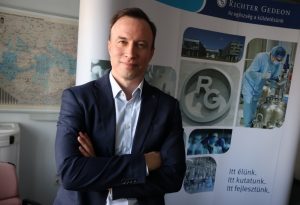
Photo: Hungary Today
In addition to developing new products, RG is also investing in the production of medicines such as biosimilars, drugs whose copyright had expired, for example through the recent acquisition of shares in the German company Formycon. How can you compete in this field with cheap products from China or India?
There is an area of our work, which is not about developing a new therapy, but about making an existing product available to as wide a range of people as possible. This is the field of biosimilars and small-molecule generic drugs with which we want to provide medicines to people in need more cheaply and in greater quantities. At the same time of course developing countries can produce them for less and on a larger scale, which is partly a matter of economy of scale. Hence cost-effectiveness and speed are two aspects that we need to focus on constantly.
Over the last decade and a half, there has been a big focus on competition with Asia, but today the shorter supply chain aspect is gaining ground. The cost aspect has been pushed back a bit. This is because there are shortages, especially in the US, that the local healthcare system can no longer tolerate. It is no longer acceptable for a developed country to rely on one or two companies in the Far East to secure patient care. This became even more apparent during the Covid outbreak.
Richter was one of the main sponsors of the 32nd European Congress of Psychiatry in Budapest, between April 6-9, 2024. How did this co-operation come about?
For us, the relationship with doctors is essential, because it is useless to produce drugs if doctors do not know about the latest scientific achievements, the best therapeutic solutions, and therefore they do not prescribe it and in the end the patient is not cured. Our impact on society would be zero without health care providers. Our work does not end when we deliver our products, we also have to make sure that the patient gets it. Doctors are our biggest partners in this. This occasion of the European Congress of Psychiatry in Budapest is a good opportunity for us to make Richter visible to them. Thousands of psychiatrists have come to Budapest and we are happy to be one of the main sponsors of the event. This should not come as a surprise as Richter is one of the most prominent players on the European psychiatric map, being the producers of the fastest growing anti-psychotic drug in the world.

Photo: Hungary Today
What is your experience concerning the supply of Hungarian professionals in the chemical and pharmaceutical industry? How does Hungary compare with other regions where RG has experience in this area?
There is a lot to be done in life sciences to maintain this world-class capability in Hungary. This starts already in primary school, where we have identified some tasks in the fields of chemistry and biology. We are spending a lot of money on this, investing professionally in programs that awaken children’s interest in the profession. We are also working with universities to get the right number of graduates with relevant qualifications out of the Hungarian university sector. We have PhD programs, a Richter department at Semmelweis University in Budapest, and we are also involved in several other educational activities. We are also trying to ensure a supply of new talents through scholarships.
What should inspire young talents to choose the pharmaceutical industry? For example, are the salaries in the sector competitive?
I think yes, it is worth looking for a career in industrial pharmaceutics. The working conditions we can offer here are more diverse and international. The other thing, and this inspires many people, including me, is that at the end of the day, people’s lives and their quality of life depend on what we do. Through the work of thousands of our colleagues we were able to produce 305 million boxes of medicines last year, about the same amount as the turnover of all Hungarian pharmacies put together.
Featured Image: Gedeon Richter